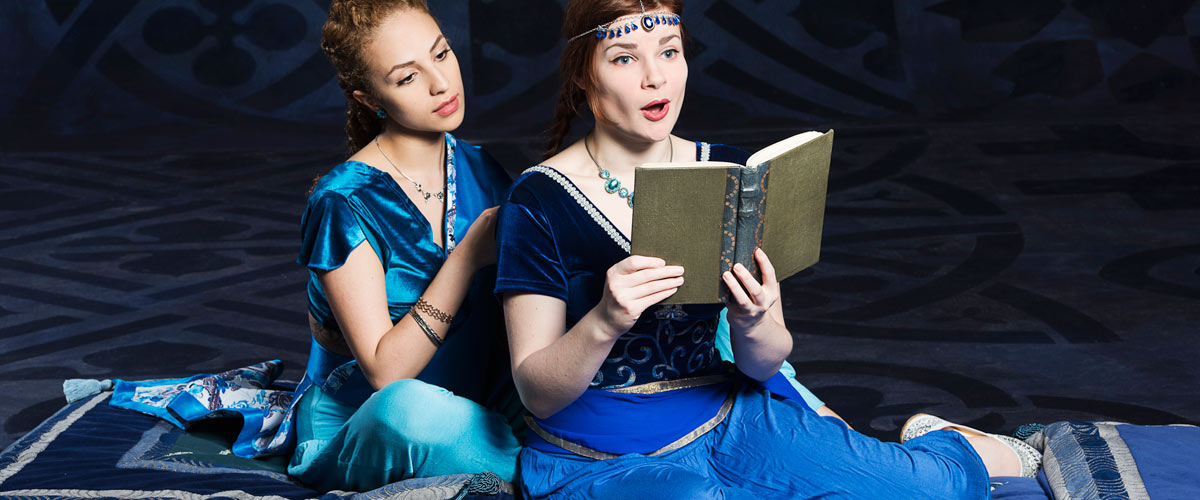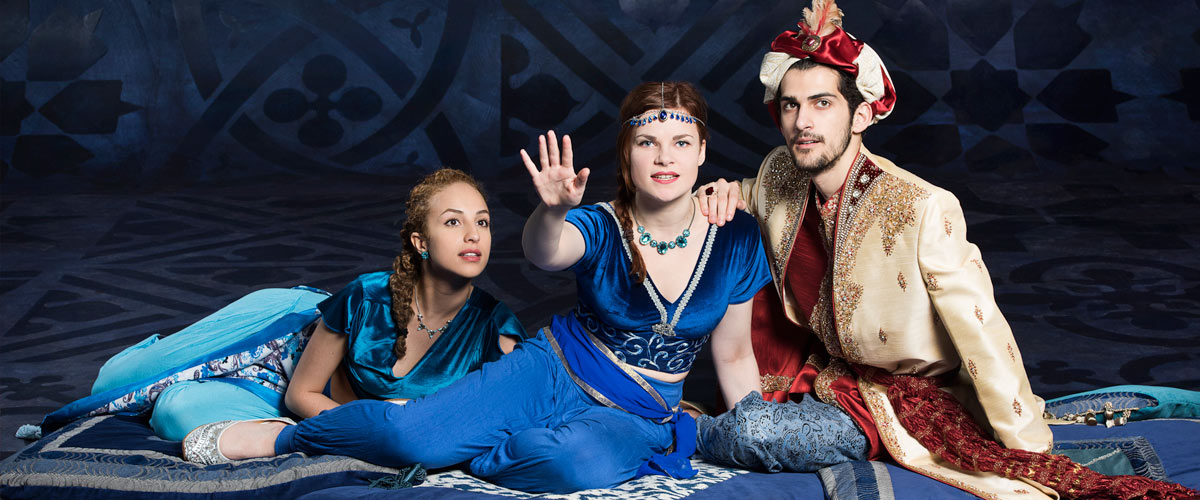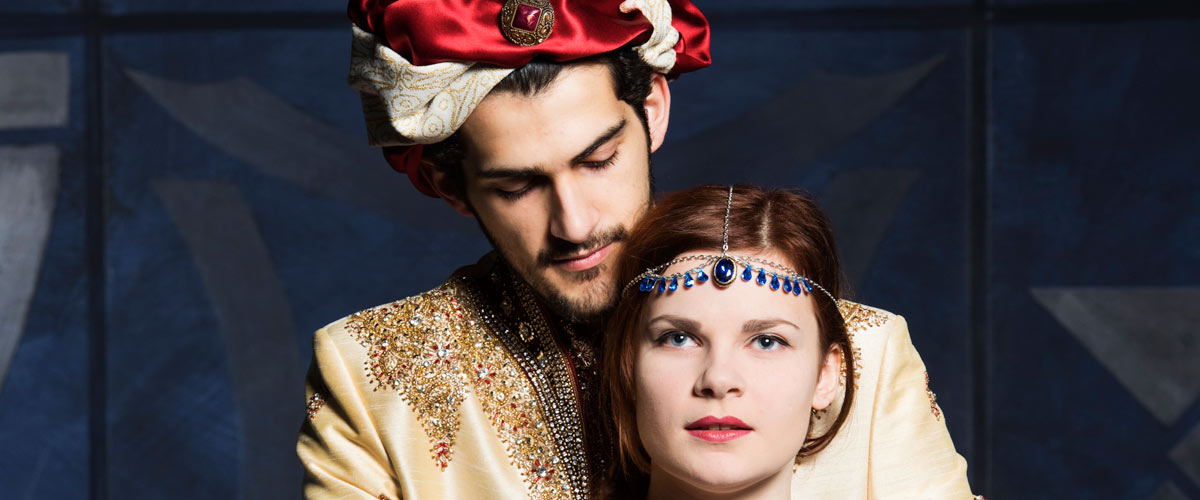THE ARABIAN NIGHTS
on the subjectOn the Subject
Welcome to the companion website of UBC Theatre & Film's 2016 production of
THE ARABIAN NIGHTS.
On this showsite, you’ll meet the Company, see production photos, view design renderings, download the production program, and explore behind-the-scenes research.
THE ARABIAN NIGHTS
By Mary Zimmerman
Adapted from THE BOOK OF THE THOUSAND NIGHTS AND ONE NIGHT
Directed by MFA Candidate Evan Frayne
Presented by the Department of Theatre and Film at the University of British Columbia
THEATRE SERIES
March 17 – April 2, 2016 | 7:30PM
Frederic Wood Theatre, 6354 Crescent Rd
TICKETS :
Adult: $24.50, Seniors: $16.50, Students: $11.50
604.822.2678 or box.office@ubc.ca
Book Online: ubctheatretickets.com
— SHE TOLD STORIES TO SURVIVE UNTIL SUNRISE —
Passionate, playful, provocative storytelling, The Arabian Nights by Tony Award winning playwright/director Mary Zimmerman and directed by Vancouver favourite Evan Frayne tells the tale of Scheherezade’s nightly telling of evocative tales. 1001 nights later the storyteller and listener are forever changed.
The 16 person cast of exuberantly talented Final and Intermediate year students from the UBC BFA Acting program romp through the lesser-known tales from One Thousand and One Nights, a collection of Middle Eastern and South Asian stories and folk tales compiled in Arabic during the Islamic Golden Age. As told by Drama Desk Award and Tony Award winning Mary Zimmerman, the power of storytelling to affect change, rises to the fore.
Sumptuous costumes in shades of blue by Nicole Bairstow, BFA in Theatre Design & Production, with an evocative set design by MFA candidate Heipo Leung, a sandbox of ornate pillows and lanterns, the performers never leave the stage while playing all the original music by Sound Designer Andy Horka themselves.
Story: Enraged by his wife’s adultery, King Shahryar marries a bride a day and beheads her at sundown. When his vengeance ravages the town of its women, Shahryar finally meets his match when he weds the captivating storyteller Scheherazade. Each night he prepares for her execution but her evocative tales of human folly mesmerize Shahryar into delaying the deed. Over the course of one thousand nights, the plot thickens and Scheherazade’s legends change both of their lives.
CREATIVE AND PRODUCTION TEAM – Evan Frayne (Director), Robert Gardiner (Scenery and Lighting Design Supervisor), Sophie Tang (Lighting Design), Tory Ip (Assistant Lighting Design), Heipo Leung (Scenic Design), Gwendolyn Loi and Courtney Verwold (Assistant Scenic Design), Nicole Bairstow (Costume Design), Lizzy Fu & Nicolette Szabo (Assistant Costume Design), Andy Horka (Sound Design), Jessica Lai (Assistant Sound Design), Benton Neufeld (Stage Management), Megan Lavergne & Linda Yang (Assistant Stage Management).
CAST – Elizabeth Willow (Scheherezade), Francis Winter (Shahryar), Mariam Barry (Ensemble), Riley Bugaresti (Ensemble), Daniel Curalli (Ensemble), Rowan Denis (Ensemble), Seamus Fera (Ensemble), Tai Graumen (Ensemble), Bronwyn Henderson (Ensemble), Sarah Hicks (Ensemble), Stefanie Michaud (Ensemble), Sophia Niewerth (Ensemble), Sachi Nisbet (Ensemble), Cassandra Phillips Grande (Ensemble), Parmiss Sehat (Ensemble)
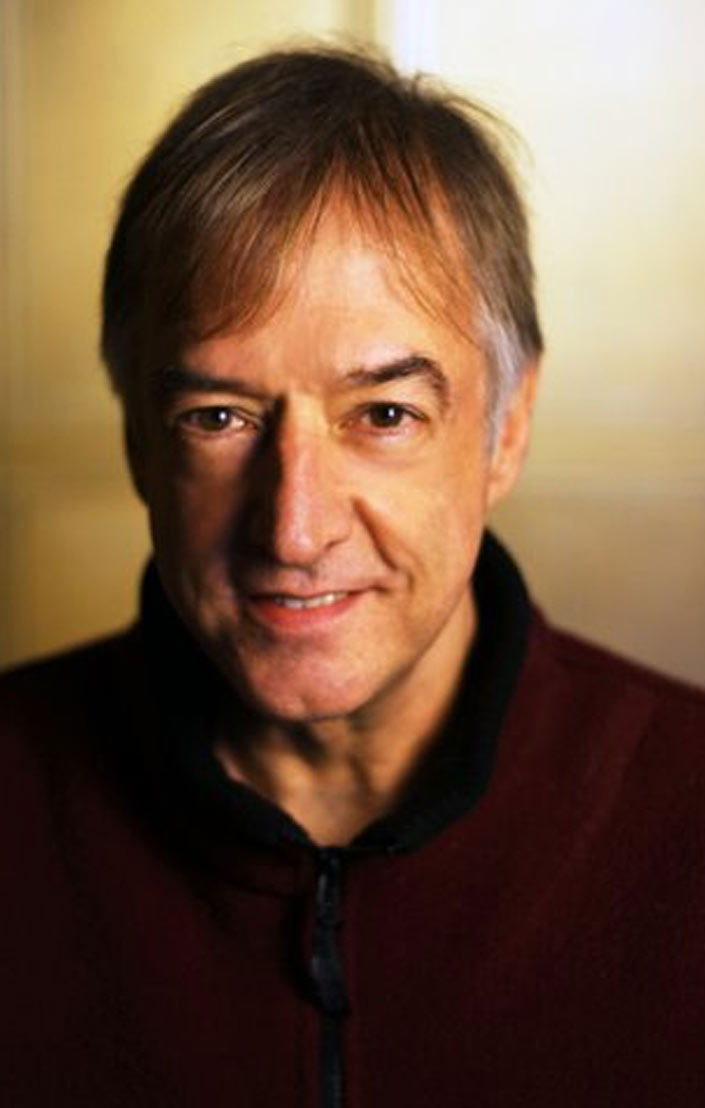
STEPHEN HEATLEY,
Professor and Head, Department of Theatre and Film
Stephen Heatley, Professor and Head, Department of Theatre and Film
Story-telling. We are a department of story-tellers. We tell our stories in many ways - through acting, directing, design, stage management, playwrighting, film making, and the critical analysis of all of the above to wrest the full meaning and significance from them. Story-telling is an art that has been practiced since time began. I am proud that our department continues that story-telling tradition here on the UBC campus in the twenty-first century, especially during UBC’s centennial year.
I wonder where the instinct comes for any of us to be drawn to the power of the story. For me, there is instruction, there is healing, there may be a laugh or there may be just an opportunity to share a moment of humanity with another. All potent stuff. I hope you are availed of any or all of these things tonight as the emerging artists of the Department of Theatre and Film breathe life into a classic tale of a young women that prevents her own death by spinning a tale…or 1001.
So, the busiest department on campus continues on at a frantic and exciting pace toward the end of April. You are witnessing one of our plethora of events tonight. You could join us for the “Regional Identities on a Global Scale” conference taking place March 31 to April 2 on campus. You could join us for more fun (and more stories) at the UBC Centennial Film Festival on April 2 at Vancity Cinema featuring the work of our celebrated UBC Film Graduates. You could join us for the MFA directing one-acts being presented in the Dorothy Somerset Studio April 14, 15, 16. You could join us for the Persistence of Vision (POV) Festival of Student Films at The Norm Cinema in the old Student Union Building on April 22 and 23 featuring the work of our current BFA students. Or you could join us for the Tri-university Colloquium Conference “Milestones and (co)memoration” on April 29 and 30 presented by the Graduate Students of our department.
And do join us next year for another exciting season of plays here on the Frederic Wood Stage, the Dorothy Somerset Studio and, for the first time in three years, The Telus Studio Theatre in the Chan Centre. Stories for everyone!
Stephen Heatley
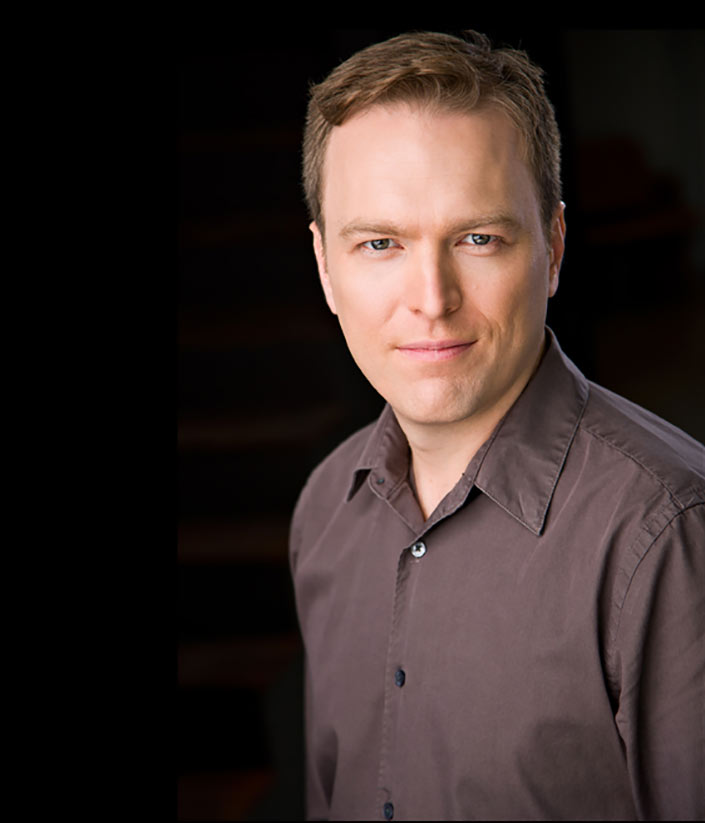
Evan Frayne, Director, UBC's production of THE ARABIAN NIGHTS
Evan Frayne, Director
THE ARABIAN NIGHTS
When I read The Arabian Nights, I fell in love with it right away. I was aware of the 1001 Nights stories, but I had never encountered them this way. I found myself mesmerized by the experience of reading these tales layered on top of each other in such a potentially theatrical way, and the mixture of the sacred with the profane. And I was encouraged by the tremendous hope at the core of the play. It was unlike anything I had ever worked on as an actor or a director. And it moved me, which ultimately, is the reason I go to the theatre.
The idea that story-telling is essential to fostering and developing empathy for ourselves and for others is at the heart of The Arabian Nights. The intention of each of these stories is for the story-teller to help expand the listener’s consciousness to the trials, challenges and experiences of other people. To emphasize and remind us that we are part of a much larger fabric of life than just ourselves. We are reminded of accepting where we are in life and to give up control over those things that we cannot control.
My impulse with this production is to explore and to attempt to understand the diversity and depth of eastern cultures through their history of storytelling. In both the source material, and our play, are stories from such a wide range of cultures, from Persian, South Asian and Arabic myths and histories. The play feels like a celebration of story-telling- there is incredible joy, passion and emotion at the core of these tales. That is what I wanted to tap into- our joy of exploring these stories and this opportunity to share them with you.
I asked a lot of people for their perspective from the beginning of this journey and I am grateful to so many for their insight; Siyuan Liu, Kirsty Johnson and Selena Couture for their knowledge and discussions about intercultural theatre, Rachael Sullivan and the Equity and Inclusion Office, and Camyar Chai for his perspective on Islam and the practice of intercultural theatre.
Thank you so much to my advisor Stephen Malloy for his support and guidance throughout the process. And to Tom Scholte and Stephen Heatley for their wisdom and unique perspectives on the craft of direction in the theatre.
Thank you to my designers Heipo, Nicole, Andy and Sophie, and to Jay, Brad, Keith, Lynn, Jodi, and all the production students for putting this together. Thank you to Cathy for her lovely choreography, Brad for his insight and thoughtful approach and Gayle for her constant support. To my wonderful cast for trusting me and joining me on this journey.
And to Susie, my parents, Zoya and Arnie, for their eternal belief in me.
Thank you for choosing to come to the theatre tonight. I hope you enjoy the show!
Evan Frayne
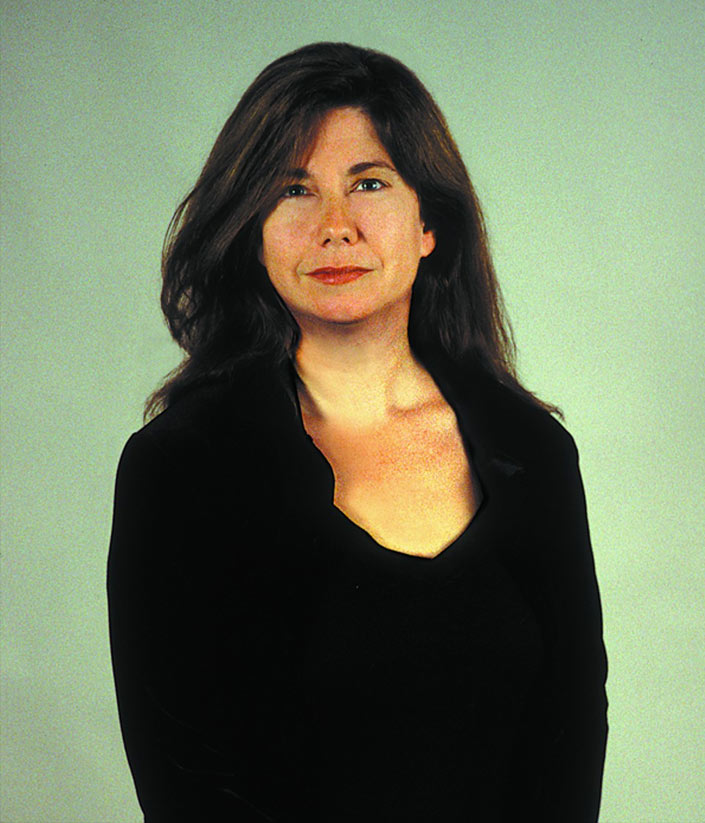
Mary Zimmerman, Playwright of UBC's production of THE ARABIAN NIGHTS
Mary Zimmerman, Playwright
THE ARABIAN NIGHTS
About Mary Zimmerman
Mary Zimmerman is the recipient of a 1998 MacArthur Fellowship, the 2002 Tony Award for Best Director of a Play and numerous Jeff Awards (including Best Production and Best Direction). She is an Artistic Associate of Goodman Theatre, a member of Lookingglass Theatre Company and a professor of performance studies at Northwestern University.
Ms. Zimmerman has adapted and directed Metamorphoses, which appeared on Broadway and at Lookingglass Theatre Company, Seattle Repertory Theatre, Berkeley Repertory Theatre, the Mark Taper Forum and Second Stage Theatre; The Notebooks of Leonardo da Vinci at the Goodman, Brooklyn Academy of Music, Seattle Repertory Theatre and Second Stage Theatre; Journey to the West at the Goodman, the Huntington Theatre Company and Berkeley Repertory Theatre; The Odyssey at Lookingglass Theatre Company, the Goodman, McCarter Theatre and Seattle Repertory Theatre; Mirror of the Invisible World and Silk, both at the Goodman; The Arabian Nights at Lookingglass Theatre Company, Manhattan Theatre Club, Brooklyn Academy of Music, Berkeley Repertory Theatre and Kansas City Repertory Theatre; Argonautika at Lookingglass Theatre Company, Berkeley Repertory Theatre, the Shakespeare Theatre Company and McCarter Theatre; The Secret in the Wings at Lookingglass Theatre Company, Berkeley Repertory Theatre, McCarter Theatre and Seattle Repertory Theatre; Eleven Rooms of Proust at Lookingglass Theatre Company and About Face Theatre (co-produced by the Goodman); a new opera with Philip Glass, Galileo Galilei, at the Goodman, The Barbican in London and Brooklyn Academy of Music; Candide at the Goodman, the Shakespeare Theatre Company and the Huntington Theatre Company; The Jungle Book at the Goodman and Huntington Theatre Company and The White Snake at the Goodman, McCarter Theatre, Oregon Shakespeare Festival and the Wuzhen Theatre Festival in China.
In addition, Ms. Zimmerman has directed Shakespeare’s Pericles and All’s Well That Ends Well at the Goodman and Henry VIII and Measure for Measure at New York Theater Festival’s Shakespeare in the Park. She made her Metropolitan Opera directorial debut in 2007 with Lucia di Lammermoor, which she also directed at La Scala in Milan in 2014. Subsequent Met productions include Armida and La Sonnambula.
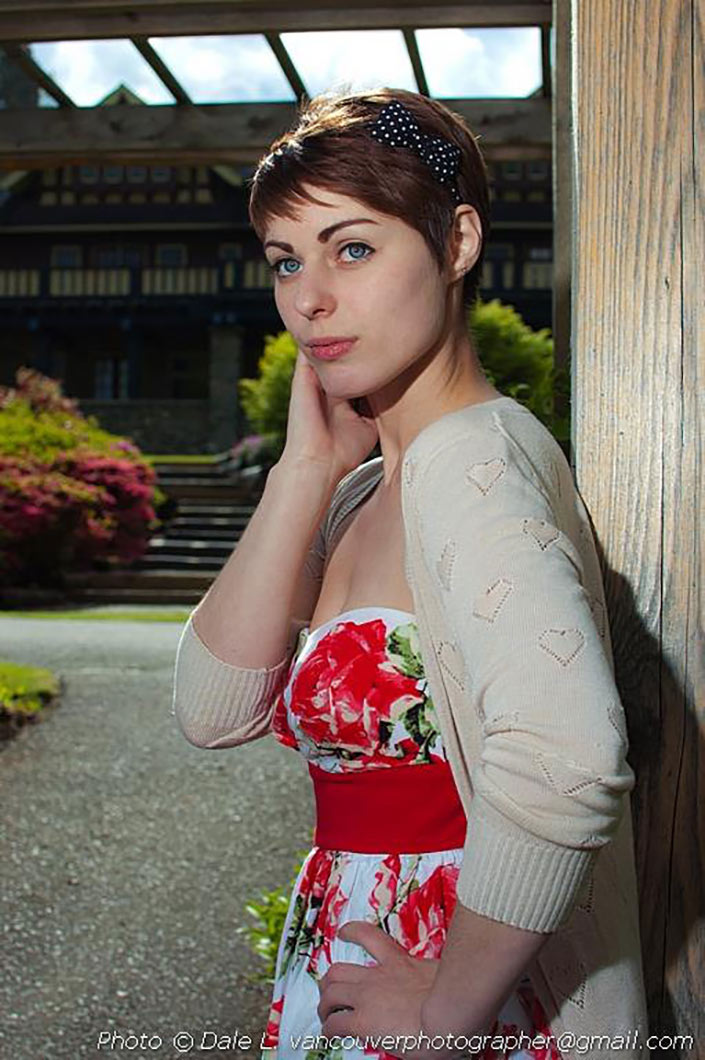
Nicole Bairstow, Costume Designer of UBC's production of THE ARABIAN NIGHTS
Nicole Bairstow, Costume Designer
THE ARABIAN NIGHTS
Q & A
1. What was your creative process like for The Arabian Nights and was it unique to this play?
After reading the play I was very excited to get started, as the story of Arabian Nights offers so much freedom of exploration when it comes to the costumes.
Our show went through many different concepts and transformations before the director and creative team decided on what you will see on stage today. First we started in a land of fantasy, with an Arabic feel; then we shifted to a more modern contemporary style with the possibility of uniforms and long pieces of fabric. Ultimately we decided to have it be timeless, and to deal with the issue of multiple character changes that are occurring on stage I decided to go back to the idea of the fabric pieces. With this each character is able to transform into another with just a single piece of fabric. Of course, as with the costume construction of any show, many compromises and alterations had to be made during this process due to limitations, but overall my concept was achieved and I think the costumes turned out beautiful!
2. What inspired you?
As a person who was raised by Disney animated films, I, and I am sure many others too, had certain images come to mind when thinking of Arabian Nights. The film Aladdin, is what I am referring to, and while it presents a beautiful world, I didn’t want to get caught up in it, so I tried to steer in my own direction. I did quite a bit of research to try and nail the fashions of the time and area down, and during my research I came upon the real life Kahlifa, Harun al-Rashid and one of his wives, Zubaidah bint Ja`far, became a huge source of inspiration for me. She was a wise, well educated, compassionate and she was a highly regarded in the fashion world, setting trends and bringing in different fashions from around the world. I used her image throughout my design, as well, I tried to incorporate many of her fashion and personality into the design for our lead female character Scheherezade.
3.Tell us about your history with costume design. Did you grow up sewing?
I started sewing, like many others, in high school Home Economics. It started as a class, and grew into a hobby. I started altering bought pieces to be made into cosplay costumes, which are costumes based on characters from comic books, tv shows or other media. When I transferred into the Film and Theatre department at UBC it became more than just a hobby for me. It was a career, a life path, and I couldn’t have been happier. I have come a long way from being an eight grader touching a sewing machine for the first time in Home Ec. to learning about the industry from the amazing professionals who I work with at UBC everyday.
4. What was the most unexpected discovery during the process?
Though I am unsure which was the most unexpected discovery, I do know the one that I am most grateful for and that is discovering what it was like to be apart of such an amazing team. I had two amazing assistants’ and while I was not quite sure how to use them at first, I learned how ask them for help, which led to some pretty big decision making. Furthermore, the costume shop at UBC can be a wild place with pins flying and sewing machines humming, but it became a second home, and a place of serenity. All the busy 99 students were understanding and extremely helpful with the build process. And of course the UBC staff and faculty provided the most reassuring support, always offering multiple solutions to problems I hadn’t even considered yet, especially my Design Advisor. And most importantly my Head of Wardrobe was able to almost read my mind and did an amazing job bringing my renderings to life. I have become a much better team leader, able to rely on each member of my team, and I am extremely grateful for all their support.
5. What’s next for you?
After graduation this summer I plan to work in the Theatre and Film industries in Vancouver as a seamstress. Building costumes, rather than designing them, is where my true passion lies. I love working from start to finish on a garment, creating something new. I still create cosplay costumes for myself and plan to continue this hobby. Also, I have recently become a permittee at Iatse 891, (film union in Vancouver) and plan to work on my full membership over the summer. Furthermore, I hope to work in the costume shop at Bard on the Beach again this summer. This industry provides many exciting and unexpected opportunities that I can’t wait to delve into.
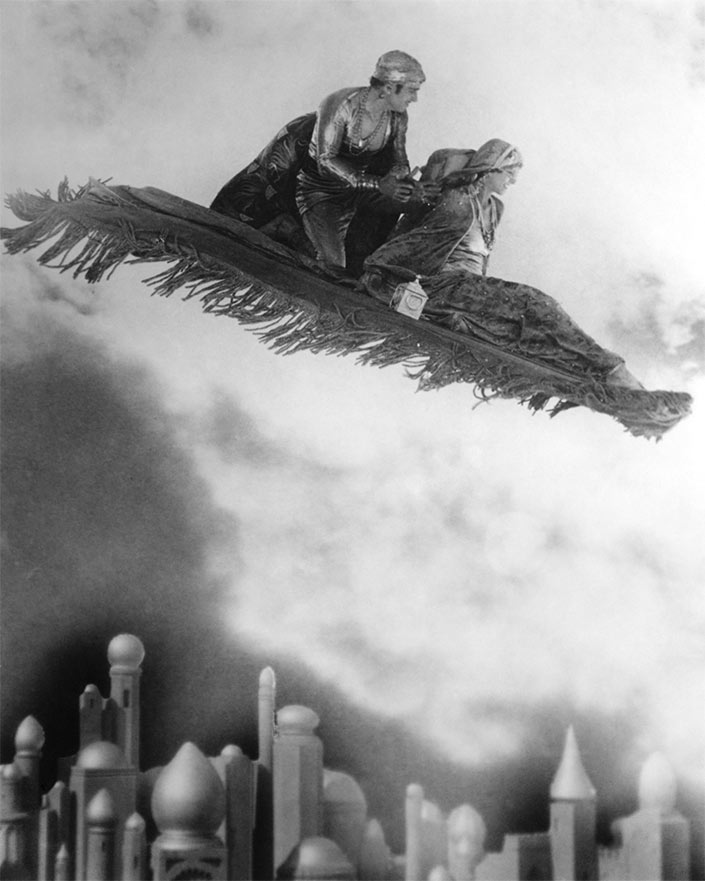
Raoul Walsh's classic The Thief of Bagdad (1924)
Diamonds in the Rough: Cinema and The Arabian Nights
By Matthew Gartner, MA candidate, UBC Film Studies
Western narrative interpretations of One Thousand and One Nights have traditionally lent themselves to a visual style marked by the "fantastic foreign" or "enticing imaginary". Perhaps, then, it should come as no surprise that these tales have been a consistent preoccupation for cinematic artists. Georges Méliès, one of film's most dynamic and enthusiastic early figures, released The Palace of the Arabian Nights in 1905 – a fantasy film complete with intricate Persian backdrops, chests of gold, and cartwheeling skeletons.
In the early 1920's, German legends Ernst Lubitsch and Fritz Lang each turned their attention to One Thousand and One Nights as a source text for projects of their own, and both produced highly influential works. Lubitsch's One Arabian Night (1920) and Lang's Destiny (1921) (containing both the familiar frame story device and a phenomenal flying carpet sequence) provided a rich database of visual effects and tones from which Raoul Walsh's classic The Thief of Bagdad (1924) was able to borrow. The film starred the so called “King of Hollywood” Douglas Fairbanks, and was remade 16 years later in technicolor and under the same name. The 1940 version of The Thief of Bagdad won 3 Academy Awards, is widely agreed to be the first major use of blue screen technology in cinema, had production interrupted by the Second World War, and contains a line of dialogue that suggests that the world has a roof above it that is held up by a Genie.
In 1974, Italian director Pier Paolo Pasolini made Arabian Nights, which – in a departure from the majority of its predecessors and successors in the adaptations of these tales – took a relatively true-to-text approach, rather than simply making use of the geographical backdrop and mixing multiple tales together into single narratives. Pasolini's film was entered into the Cannes Film Festival in 1974, and won the Grand Prix Spécial du Jury (since shortened to Grand Prix, and indicating a second place finish – Francis Ford Coppola's The Conversation won the Palme D'Or). For each of these influential interpretations, there are dozens more that range from the forgettable to the hilarious – or sometimes both, as in the case of Elvis Presley's Harum Scarum (1965).
The fantasy that seems to accompany these tales could be one reason for animation's relentless interest in them. The oldest surviving animated feature film, Lotte Reiniger's The Adventures of Prince Achmed (1926), required over 3 years to animate slightly over one hour of screen time. The final hand-drawn feature produced by Dreamworks, Sinbad: Legend of the Seven Seas, was released 77 years later in 2003. And Aladdin (1992), with all of its spectacle, staying power, and Disney “charm,” perhaps crystallizes the tendencies of these cinematic works – adventure, allure, the frame story, and a 3 minute magic carpet ride that floats over both Egypt and China. These films may want to entice us with the foreign, but they can also be something else – important works of art that want to tell us a story.
BOX OFFICE
Purchase tickets to our shows online or in person!
In Person
Visit our Box Office at the Frederic Wood Theatre in person (map & directions)
Call or Email Us
Telephone: 604-822-2678
Fax: 604-822-5985
Email: box.office@ubc.ca
Write to Us
UBC Theatre and Film, University of British Columbia, Room 203, 6354 Crescent Road, Vancouver, BC V6T 1Z2
